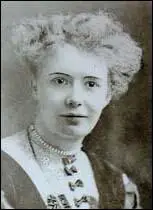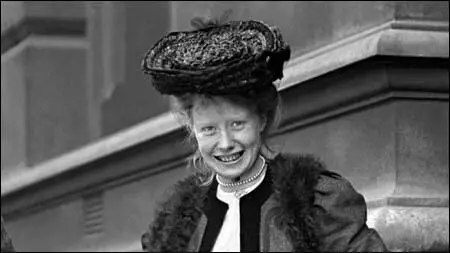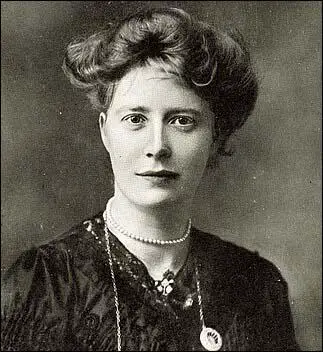Mary Macarthur

Mary Macarthur, the daughter of John Macarthur and Anne Martin, was born in Glasgow on 13th August 1880. The couple had six children, but only three survived, all of them girls. Mary attended the local school and after editing the school magazine, decided she wanted to become a full-time writer.
In 1895 the family opened a drapery business in Ayr and Mary was taken on as a book-keeper. John Macarthur was a supporter of the Conservative Party and an opponent of trade unions and sent his daughter to observe a meeting of the Shop Assistants' Union.
Mary was converted to the cause of trade unions by a speech made by John Turner about how badly some workers were being treated by their employers. Mary became secretary of the Ayr branch and at socialist meeting in the town, she met and fell in love with Will Anderson, an active member of the Independent Labour Party.
In 1902 Mary became friends with Margaret Bondfield who encouraged her to attend the union's national conference. She later recalled: "I had written to welcome her into the Union, but, when she came to meet me at the station, I was overcome with the sense of a great event. Here was genius, allied to boundless enthusiasm and leadership of a high order, coming to build our little Union into a more effective instrument." Mary was eventually elected to the union's national executive. Mary's political activities created conflict with her father who had a strong hatred for socialism. Anderson proposed marriage but Mary decided to pursue a career instead, and in 1903 moved to London where she became Secretary of the Women's Trade Union League.

As well as her trade union activities, Macarthur was an active member of the Independent Labour Party in London where she worked closely with two other Scots, James Keir Hardie and Ramsay MacDonald. Macarthur was involved in the Exhibition of Sweated Industries in 1905 and the formation of the Anti-Sweating League in 1906. The following year she founded The Woman Worker, a monthly newspaper for women trade unionists. Later it was transformed into a weekly with a circulation of about 20,000.
Angela V. John has argued: " Mary Macarthur is perhaps best known for founding the National Federation of Women Workers (NFWW) in 1906. She began as president, but then exchanged offices with Gertrude Tuckwell (1861–1951) to become general secretary. By the end of its first year the NFWW boasted seventeen branches in Scotland and England and about two thousand members. Mary Macarthur was especially concerned about the relationship between low wages and women's lack of organization."
Mary Macarthur was an inspirational figure and recruited many women into the movement. This included Dorothy Jewson and Susan Lawrence, who both went on to become Labour Party MPs. Active in the fight for the vote, she was totally opposed to those women in the NUWSS and the WSPU who were willing to accept the franchise being given to only certain categories of women. Macarthur believed that a limited franchise would disadvantage the working class and feared that it might act as a barrier against the granting of full adult suffrage. This made Macarthur unpopular with middle class suffragettes who saw limited suffrage as an important step in the struggle to win the vote.
Mary Macarthur sat on the executive of the Anti-Sweating League and gave evidence to the select committee on homework in 1908. Macarther also campaigned for a legal minimum wage. In the summer of 1911 she organized an estimated 2,000 women involved in twenty concurrent strikes in Bermondsey and other areas of London.

Will Anderson followed Macarthur down to London and the couple married on 21st September 1911. Their first child died at birth in 1913 but two years later a daughter, Anne Elizabeth, was born. Anderson was elected to the House of Commons to represent Sheffied Attercliffe in 1914 but was defeated in 1918. Macarthur also stood as a Labour candidate in Stourbridge, but like the others who opposed the First World War, she was defeated in the 1918 General Election.
Mary was devastated when Will Anderson died in the 1919 influenza epidemic. She continued her work with the Women's Trade Union League and played an important role in transforming it into the Women's section of the Trade Union Congress.
Mary Macarthur developed cancer in 1920 and after two unsuccessful operations died at home, 42 Woodstock Road, Golders Green on 1st January, 1921. She was cremated at Golders Green Crematorium three days later.
Primary Sources
(1) John Turner, an official of he Shop Assistants Union, met Mary Macarthur in 1901.
I visited Ayr to open a branch of the Union, and a fairly well-attended meeting was held in a rather dark and dreary schoolroom in an obscure part of the town. Among those present I noticed an animated group of young ladies in the centre of the room, with a laughing, vivacious, fair-haired girl in their midst. I immediately turned my attention to them, and I remember even now that I felt I had got to arrest the attention of this part of the audience if we were to get a branch opened. As soon as I sat down, and questions had been answered, I made straight for this group, and asked the fair-haired girl (who, I could tell was the leader) whether I could persuade her to join the Union. This seemed to surprise her, and she smilingly said she feared she was not eligible. I then learned that she was engaged in her father's business, and therefore she expected it was not possible for her to join. She, however, frankly said that she thought all the young ladies (who, she told me, were assistants in her father's shop) should join.
(2) Margaret Bondfield, A Life's Work (1948)
In 1902 Mary Macarthur came as a delegate, and leader of the Scottish contingent, to the Newcastle Conference of the Union. I had written to welcome her into the Union, but, when she came to meet me at the station, I was overcome with the sense of a great event. Here was genius, allied to boundless enthusiasm and leadership of a high order, coming to build our little Union into a more effective instrument.
(3) During the First World War Mary Macarthur was active in the National Federation of Women Workers. Margaret Bondfield, wrote about her activities in a A Life's Work (1948)
Mary Macarthur had endeavoured for a long time to get a minimum wage ruling for a very large class of operatives in munitions work. In 1916 she had secured an award from the Munitions Tribunal for an increase in the wage rate for a large firm in the Newcastle area employing 8,000 women. Week after week went by, and still the firm was not given authority to pay the increased rate.
One morning Mary was rung up, and the furious voice of Winston Churchill, Minister of Munitions, asked her in effect what did she think she was up to, allowing the girls to stop work. Mary answered that the girls had waited patiently for the wages award granted them three months ago. She had not advised them to come out, and she would not advise them to go back until the firm was instructed not only to pay the rate, but promptly to pay the back money.
It was a stay-in strike, and the girls sat on their seats before the machines, knitting socks for soldiers. Within twenty-four hours the authorization to pay the rates came to the firm and work was resumed.
(4) Editorial, Time and Tide (27th February, 1925)
The growing unrest which culminated in the Dock Strike of 1889 stimulated the organised women to revolt in the sweated trades of matchmaking and laundry work. Meetings held by the Amalgamated Society of Laundresses to protest against their exclusion from the Factory and Workshops Bill of 1891, enlisted public sympathy on their side. Women's unions - some eighty or ninety - sprang up under the auspices of the League, most of which expired through lack of money and of co-ordinated direction. It was not until 1903 that the woman capable of supplying both those essentials to successful agitation appeared upon the horizon. Her name was Mary Macarthur.
In amalgamating all these isolated efforts in the National Federation of Women Workers, Miss Macarthur rendered an inestimable service to the cause of the woman worker. Without her opportune support the strike among women employed at Millwall Food Preserving Factory, and those of the Cradley Heath Chainmakers and the Kilburnie netmakers would have been doomed to failure. Relief from their starvation wages and intolerable conditions was largely due to Miss Macarthur's able championship of their claims. As a result the membership of the Federation rapidly increased, and the movement spread from the ranks of industrial workers to the equally underpaid but better educated women employed in the distributive trades. To the establishment of Trade Boards, in 1909, for the purpose of regulating women's as well as men's wages, Miss Macarthur lent all her energy and influence. This innovation had the double effect of imposing minimum wage-rates in sweated industries and of demonstrating to the workers engaged therein the value of Union backing.

